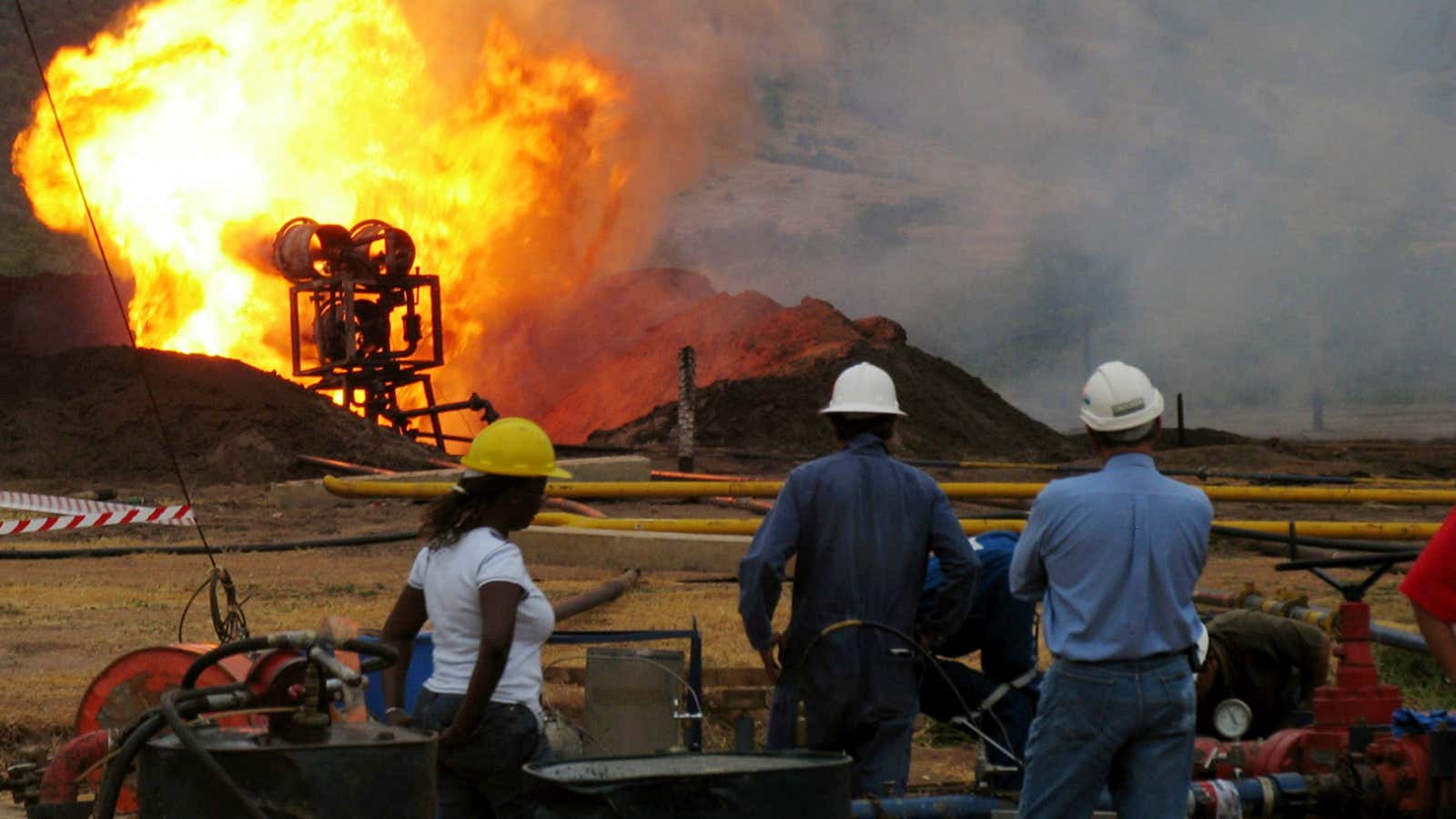This item has been corrected.
Last year I visited the posh Kampala office of Tullow Oil, the most visible of the three major oil companies currently operating in Uganda. I was welcomed by an all-Ugandan staff that led us into a room and gave us a detailed, surprisingly frank assessment of oil development thus far. Roads, pipelines, and the oil refinery are in various stages of planning and construction, which began with official Tullow site visits in 2007. But they explained that while locals are being hired, oil is not labor intensive and won’t provide a wealth of jobs. Amidst the genuine openness and some corporate doublespeak, questions about the environment, rural development, and human rights were always answered with a disclaimer. “The government has to lead,” I was told. “They have to take steps, and we will follow.”
Mixed with a single-party state, simmering ethnic tensions, and regional instability, oil may not be the savior that Uganda hopes. It offers an estimated $75 billion in assets, five times Uganda’s 2010 national GDP, as well as immense fears.
“The resource curse? We’re already in the resource curse,” laughed many Ugandans when asked about oil development.
It wasn’t always this way. Seven years ago, the discovery of oil in the Albertine Rift region, close to the border with the Democratic Republic of the Congo, brought hope to a country in dire need of infrastructure. Uganda also faced international pressure from the aftermath of bloody, resource-driven wars in Nigeria and the Congo. This pushed Uganda toward pursuing open, transparent oil development. Local and international NGOs added to the call. Uganda, everyone believed, would be different.
What emerged was surprising. Policy guidelines released in 2008, from the Petroleum Ministry, were remarkable in their attention to global best practices. A meticulous separation of powers, specific functions for parliamentary oversight, the Petroleum Authority and several other government ministries and agencies. Best practices for environmental management, which included consideration of a company’s environmental history and ability to use clean, state of the art technology before licensing. If implemented, it would rival the West in terms of accountability and transparency.
Five years later, they remain just that: policy guidelines. Meanwhile, $2 billion has already been invested by Tullow, CNOOC, and Total, which were given licenses to explore oil deposits long before parliament passed comprehensive laws governing oil development and revenue allocation.
As investment increases, the Petroleum Ministry has expanded its power, building closer ties with President Yoweri Museveni. Parliament eventually passed laws that barely resembled the previously lofty policies. Instead, it placed management and oil operations in the hands of closed-door bureaucrats and gave ample leeway to companies to operate as they please. Basically, business as usual, with no oversight.
This year, it has only gotten worse. After an attempted coup in May (many Ugandans feel it was a setup), journalists and activists were arrested and The Monitor, Uganda’s leading newspaper, was temporarily closed. The president consolidated power and put his son in a high military role, a position where he would potentially inherit power when Museveni either stepped down or died. Corruption—the primary means by which powerful politicians stay in power—has increased in the years since oil was discovered.
The latest was this month’s Public Management Bill, which restricts gatherings, limits press freedom, and curtails civil society. It drew outrage from Amnesty International and numerous local NGOs. If Uganda wasn’t yet in a Resource Curse, it certainly seems like its getting closer to being in one now.
While the country slips into authoritarianism, Tullow, CNOOC, and Total are chugging away under the existing laws, building rigs, pipelines, and making plans to soon begin exporting by truck. The refinery—the first in East Africa—is on target to be on stream in 2018, and third-party estimates show that the government has already received close to $1 billion in revenue from lease sales, capital gains taxes, and royalties. This is only an estimate since the Ugandan government refuses to release any official information on oil revenue and expenditures.
If we’ve learned anything from history, instability rarely effects resource exports. Even in the worst days of the Congolese civil war, rare minerals were still being shipped abroad, snaking through a long supply chains until they found their way into Western electronics.
Uganda is one of the youngest countries in the world, expected to increase in population from a manageable 27 million today to 130 million by 2050. The margin of error is so tiny: even a small level of corruption could mean millions of Ugandans are left behind. Seventy-five billion sounds like a lot, but divided among today’s population, and it’s only a little more than $3,000 a person. Add in unborn millions and this “boon” quickly fades, with little long-term impact even in the unlikely chance it were to be spent on healthcare, education, and rural infrastructure.
In a country which has never experienced a peaceful turnover of power, it is an omen that the future may, again, resemble the past.
Correction: A previous version of this item said that the refinery was under construction and that oil was already being exported by truck.




